Sri Guru Nanak Dev Sahib Ji’s Learners
Sri Guru Angad Dev Sahib Ji’s Devtoees
Sri Guru Amar Das Sahib Ji’s Sevadars
Sri Guru Ram Das Sahib Ji’s Singers
Sri Guru Arjan Dev Sahib Ji’s Mediators
Sri Guru HarGobind Sahib Ji’s Warriors
Sri Guru Har Rai Sahib Ji’s Forgivers
Sri Guru HarKrishan Sahib Ji’s Healers
Sri Guru Teg Bahadur Sahib Ji’s Believers
Sri Guru Gobind Singh Sahib Ji’s Khalsas
Sri Guru Granth Sahib Ji’s Admirers
Guru Ji’s Sangat, the Sikhs
No matter what race, gender, or caste you belong too, we as Sikhs are equal in all aspects of life, because equally we have been blessed with the teachings of our Gurus. No matter what path you choose, you will always Praise Guru Ji’s beliefs and teachings that are ingrained in our Sri Guru Granth Sahib Ji.
‘I evoke no fear, nor do I accept any.’
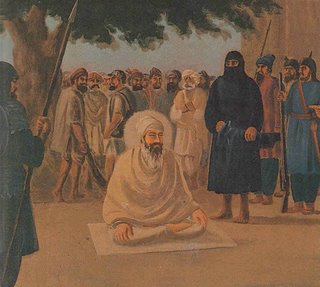
In Vachitra Natak (the Wondrous Drama) Guru Gobind Singh Jii writes the following account of Guru Teg Bahadur ji's unique martyrdom:
(13)It was for the sacred thread and the frontal mark,
That he performed a great act of chivalry.
To protect the holy, he offered all he had,
And so, he offered his head, but uttered not a sigh of grief.
(14)He suffered martyrdom for the sake of Religion...
His head he gave, but not his honour. God's men are, indeed, ashamed to act like show men and perform tricks.
Dohira
(15) Having broken the (body's) earthen pitcher on the head of the king of Delhi. He departed to the world of God. Nay, not one has performed the deed that Teg Bahadur had.
(16) The whole world mourned his loss: And cried, 'Alas, Alas,' but the domain of Gods, Resounded with the shouts of "Victory, Victory, Victory be to the Man of God. "
The pandits of Kashmir came to Anandpur Sahib, and told Guru Teg Bahadur ji their tale of woe and suffering. Guru ji was pondering over the condition of the pandits when child Gobind Rai came in. Seeing his father lost in deep thinking, he said,
"Father, what makes you ruminate in deep somebreness? "
Guru ji replied, "l am touched by the sufferings and lamentations of these people from Kashnir. Their rulers have become so cruel and atrocious. Forceful conversion is the order of the day.”
"What can be done, 0 Sire?" asked Gobind Rai, a child of nine years.
"A sacrifice of a holy person is required” said Guru Teg Bahadur ji.
"Who can be holier than you my dear father,” said Gobind Rai.
Facing the pandits Guru ji told them,
"Tell the Governor to convert our Guruji and we all will follow suit."
The Governor was happy to hear this because it was easier to convert one person. Guru ji was then summoned to Delhi. To strike terror in the mind of Guru Teg Bahadur ji, Bhai Mati Das was sawn into two from head to foot.
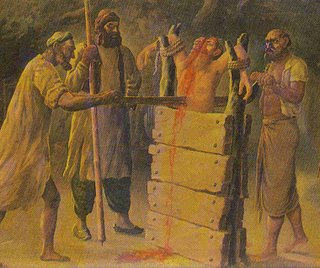
 Bhai Dyala Ji was boiled alive in a boiling cauldron, but even this second terror could not move Guru ji who was contemplating deeply on God and chanted the following verses impulsively :
Bhai Dyala Ji was boiled alive in a boiling cauldron, but even this second terror could not move Guru ji who was contemplating deeply on God and chanted the following verses impulsively :
"Those who have never sung the praises of the Lord.
They have wasted their life in vain,
Saith Nanak 0 my mind, dive into the love of God,
As fish longs to dive into water." (1st Slok)
"Why art thou steeped in vicious ways of life,
And do not for a moment feel disgusted of them?
Saith Nanak, 0 man, devote thyself to Lord, So as to escape the snares of death "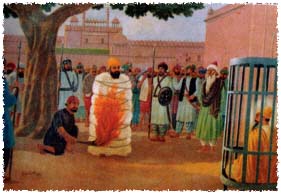 Then came the third most inhuman and vicious atrocity. Bhai Sati Das, the third companion of Guru Teg Bahadur ji, was wrapped in cotton and set blaze. But no horror could quiver these brave Sikhs and compel them to abjure their faith.
Then came the third most inhuman and vicious atrocity. Bhai Sati Das, the third companion of Guru Teg Bahadur ji, was wrapped in cotton and set blaze. But no horror could quiver these brave Sikhs and compel them to abjure their faith.
When the vicious authority found Guru Teg Bahadur ji still sturdy and firm, he was sentenced to be publicly executed. Thus Guru Teg Bahadurj i was publicly executed in Chandni Chowk, Delhi under the banayan tree.
‘Rangretta Guru Ka Beta’

Rangretta Bhai Jaita darlingly took possession of the severed head of Guru Teg Bahadhur Ji and carried ita ll the way to Anandpur Sahib with courage, where Guru Gobind Singh Ji complimented him for his audacity. He took him to his arms and exclaimed ‘Rangreta Guru Ke Beta’. (Rangrta is Guru’s Son). ‘
At this place today stands Gurdwara Sis-Ganj to which every Sikh and human loving person bows his head and pays reverence to Guru Teg Bahadurji and his companions. In the words of Guru Gobind Singh ji, shouts of, "Victory, Victory, Victory be to the Man of God," will ever go on resounding at that place and in the golden history of humanity. He sacrificed himself for the freedom of religion and human rights.
In one of the hymns. Guru Teg Bahadur ji depicts an ideal human being. He says:
That man who in the midst of grief is free from grieving.
Who is free from fear and who deemeth gold as dust,
Who is above slander and remains unaffected by praise.
Who has got no greed, no vanity and no worldly attachment,
Who remains balanced at his centre unmoved by good or ill fortune,
Who is different to honor or dishonor.
Who hath renounced all craving and desires.
And expect nothing from the -world,
Whom lust and wrath can touch not,
In the heart of such person dwelleth God.
On whom the Guru bestoweth His Grace,
He alone kiwweth the way to this conduct,
His soul, 0 Nanak, is blended with the Lord,
As water is blended with water.
…A Great Warrior, Deeply imbued with the Spirit of Self Sacrifice and Kindness…
Mata Gujjar Kaur ji: Wife of Guru Teg Bahadur Ji, mother of Guru Gobind Singh Sahib Ji. Guru Gobind Rai assumed the Guruship at the age of 9. During those early years of his life, his father, Guru Teg Bahadur, decided to make an extensive tour of the eastern parts of India, his purpose was to preach the Sikh faith among the people there. The responsibility for training Gobind Rai (Guru Gobind Singh Ji) was left in the hands of his mother, Mata Gujjar Kaur Ji. What kind of woman must she have been to be chosen by God to teach and guide Gobind Rai (Guru Gobind Singh Ji) so that he would be capable of assuming the Guruship?
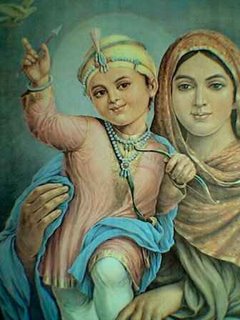
"...God works through a woman's touch. Man is what woman creates him to be..."
...One mission with two faces - the public and the private, the male and the female, the conscious and the subconscious, the power and the wisdom…
If marriage creates us as one soul in two bodies - then what is the difference between Guru Teg Bahadur Ji and Mata Gujri Ji except that they had two different jobs to do, two different times and spaces, yet sharing one light between them.
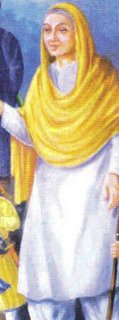 As a Daughter: Mata ji was brought up with the consciousness of the Guru’s light; she fulfilled her parent’s aspiration of serving the path of the Guru beyond their expectations by growing into a perfect role model of grace, strength, persistence and sacrifice.
As a Daughter: Mata ji was brought up with the consciousness of the Guru’s light; she fulfilled her parent’s aspiration of serving the path of the Guru beyond their expectations by growing into a perfect role model of grace, strength, persistence and sacrifice.As a Wife: She supported Guru Tegh Bahadur Ji when he was deep in meditation for years, again while he was on his missionary tour, and finally, when the Guru left for Delhi to make the supreme sacrifice.
As a Leader: After her husband, Guru Tegh Bahadur Ji’s martyrdom, she and her brother, Kirpal Chand had the responsibility of managing the affairs of the Panth. She also organized the langar (community kitchen) and played an important role as the administrator of the army. She had an important role inspiring the Khalsa armies during the battles Guru Gobind Singh Ji had to fight. Her role in the battle of Bhangani is especially remembered.
As a Mother: She molded the father of the Khalsa, the great Guru Gobind Singh Ji, raising him as a single mother after the martyrdom of Guru Teg Bahadur ji.
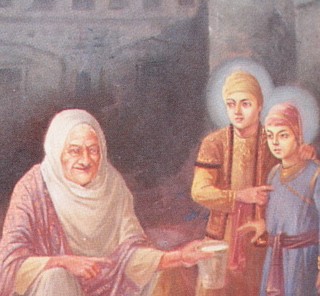 As a Grandmother: She was an inspiration to the young martyrs, her own two grandchildren. When Mata Ji and the sahibzadas were arrested and confined in Sirhind Fort, and as the children were summoned to appear in court each day, she kept urging them to remain steadfast in their faith. She constantly reminded the Sahibzadas that their Grandfather and Great-Grandfather had both sacrificed their lives to strengthen the ideals of Sri Guru Nanak Dev Ji. Her support of her grandsons played such an important role in Sikhism that as Sikhs, we probably owe our existence to her. It was due to her role that the seven and nine year old children did not budge from their beliefs and attained martyrdom. If the Sahibzadas had accepted Islam on that winter day, Sikhi probably wouldn’t exist as it does today. So, in fact, we stand tall because of the teachings and the inspiration Mata Ji provided to her grandsons and thousands of martyrs who gave their heads and not their faith.
As a Grandmother: She was an inspiration to the young martyrs, her own two grandchildren. When Mata Ji and the sahibzadas were arrested and confined in Sirhind Fort, and as the children were summoned to appear in court each day, she kept urging them to remain steadfast in their faith. She constantly reminded the Sahibzadas that their Grandfather and Great-Grandfather had both sacrificed their lives to strengthen the ideals of Sri Guru Nanak Dev Ji. Her support of her grandsons played such an important role in Sikhism that as Sikhs, we probably owe our existence to her. It was due to her role that the seven and nine year old children did not budge from their beliefs and attained martyrdom. If the Sahibzadas had accepted Islam on that winter day, Sikhi probably wouldn’t exist as it does today. So, in fact, we stand tall because of the teachings and the inspiration Mata Ji provided to her grandsons and thousands of martyrs who gave their heads and not their faith.
As a Martyr: While imprisoned on top of an open tower during the cold month of December, Mata Gujjar Kaur Ji continually did simran with no complaints about her physical being. She attained martyrdom the same day as her grandsons after hearing that her grandsons had been bricked alive rather than give up their faith. Her mission had been fulfilled.

Sakhian: A Collection of Short Stories written by children and youth
Looking for a great read before bed for your children? Well, consider buying “Sakhian”. The book is a wonderful tribute to our Sikh history and is full of beautiful stories and poems.
The anthology is called ‘Sakhian’ (for obvious reasons) is the first book on Sikh history written entirely by kids, ages ranging from 7 to 17. There will be a feature on this in an upcoming issue of SikhSpeak (be sure to subscribe if you haven’t already) but for now CHECK IT OUT FOR YOURSELF!
The Saint Soldiers
Glory filled with armies stand,
Guru’s fighters, hand in hand.
Amrit courses through their veins,
Men and Women, both the same.
God is great, they change and chant
Spreading love through every land
Defending truth, upholding rights,
Never losing Guru’s fight.
The Sikhs they are, forever true,
God’s Saint Soldiers, now guarding you!
To Read more magnificent poems like H. Kaur’s “The Saint Soldiers” – Click Here to Order

I, a warrior, ready to die.
Tearing the air with victory cry,
To the battlefield, together we ride.
He astride horse of purest white.
Above us, Chittia Baz in fight.
Steel blades flashing sharp and bright,
We fell our enemies left and right.
Watching over him day and night,
I never let him far from sight.
To shield him from all pain and strife
Now and forever, I shall try.
His throne the earth, his crown the sky,
To his mission, I give my life.
Guru Gobind Singh, great King, on high,
Your humble servant, Mai Bhago, am I
Guru Gobind Singh, great King, on high,
Your Humble Servant, Mai Bhago, am I.
To Read more about the November Posts on Sri Guru Nanak Dev Ji Click on the following Links:
Early Childhood:
The Day –Dreamer
The Questioning Years
The Sacred Thread
Youth Years:
Guru Nanak Dev Ji Gets Married
The Boy who Traded Money for a Blessing
All Men are Brothers
The Man who was Re-born
The Journey of Sri Guru Nanak Dev Ji:
Guru Nanak Dev ji on the “Holy” Ganga
Life by Good Deeds
Gold cannot be Taken to Heaven
A King Pays Homage to Guru Nanak Dev Ji
The Rich Man and the Poor Carpenter
Sri Guru Nanak Dev Ji's Teachings:
There is Only one God
Sajjan the Robber
God is Everywhere
God Made all Men Equal
Guru Nanak Dev Ji chooses a Successor
There is Never Enough of Goodness
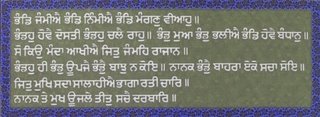
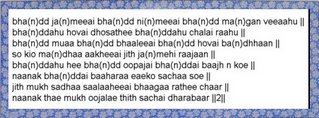
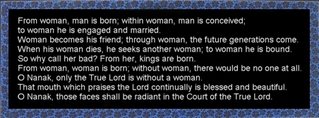
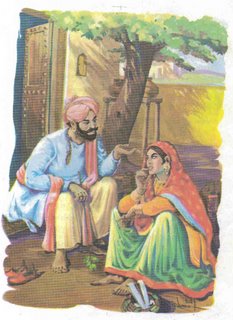
"What have I done to deserve such a son!" Kalu asked in despair. "I have sent him to the best teachers in the village but he refuses to learn. I put him to work, but he does no work; all he does is day-dream. Who will take the load off my old shoulders? Cursed is my life to be burdened with a son such as Nanak!”
"You are much too hard on the boy," his wife replied, "There is a lot of good in him. His teachers are pleased with him and have been amazed at his Intelligence."
Kalu was too upset to listen. "That is not very surprising for, after all, we are Vedis and Vedis are so named because of their knowledge of the holy books, the Vedas. But, as you well know, we are passing through difficult times. Our kings change every other day. Robbers loot caravans in broad day-light. Trade has almost ceased. It is becoming more and more difficult to make enough money to live comfortably. I want Nanak to be independent and earn a living for himself," said Kalu.
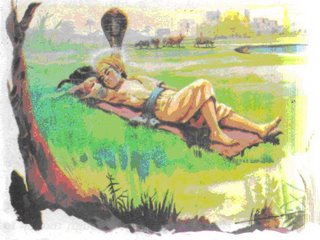 "I understand all that," replied his wife to soothe him, "but do not be so harsh with the boy. He is still very young. I am sure he will turn out well. Perhaps he will even be a great man. You remember what our neighbor told us Nanak when he was a little boy; about seeing. Asleep on the grass with a large cobra watching him and shading him from the sun with its hood! That, as you know, is supposed to be a sign of greatness."
"I understand all that," replied his wife to soothe him, "but do not be so harsh with the boy. He is still very young. I am sure he will turn out well. Perhaps he will even be a great man. You remember what our neighbor told us Nanak when he was a little boy; about seeing. Asleep on the grass with a large cobra watching him and shading him from the sun with its hood! That, as you know, is supposed to be a sign of greatness.""I do not believe in that kind of nonsense," Kalu said angrily. "In any case how will that bring money to fill our bellies? Now look at our daughter Nanaki! She is only five years older than-Nanak and yet she has always been a great help in the house."

"The cobra was not all," continued his wife, ignoring her husband's interruption. "You know very well what the village chieftain said. He was riding by his fields at noon one day, when he saw Nanak sleeping in the shade of a tree. On passing the same spot many hours later, he found Nanak asleep in the same place with the shadow of the tree still over him, while the shadows of all the other trees had moved with the sun. At that time even you were quite amazed."
"You do not really expect me to believe such stories?" replied Kalu with irritation.

"Well, you must be the only one in the village who does not. There was also that affair of the buffaloes eating up a farmer's crops! Don't you remember when Nanak had gone to herd cattle the other day, he fell asleep and let the buffaloes stray on to a neighbor’s field. The man was furious; he threatened to beat Nanak if he ever laid eyes on him again. You were also very angry with him, 'Go and see,' Nanak said to the people who had gathered, 'nothing has been damaged.' When they arrived there, not one blade of grass had been touched. The neighbors have been talking about it for weeks. You see, because of our son, God had blessed the field."
"These are just old wives' tales," Kalu retorted, "and besides Nanak has no business to be sleeping while out herding buffaloes. This just proves what I have been saying all along. He is a lazy good-for-nothing who spends all his day dreaming instead of working."
The Questioning Years
Thus the years went by and (Guru) Nanak spent more and more time alone in his dream-world. He would for long walks in the nearby forest and watch brightly colored birds flying from branch to branch. He saw trees burst into blossom in spring, lose their leaves and flowers as the heat of the summer came on and again turn into a rich green as the monsoon broke. He would sit for hours listening to the murmur bees on hot, still days and the shrill screams of the peacocks during the rainy season. At night he lay awake gazing at the stars—the misty cluster of the Milky Way, the guiding light of the North Star and the breath-taking wonder of meteors that shot across the sky.

He would not play with boys of his own age but referred to listen to his servant Mardana sing songs in praise of God. He spent days in the company of holy men who came to his village. He would sit at their feet for hours, asking them about the things that puzzled him. Why did the sun rise and set? Who made the moon and the stars? Why was man born? Where did he go when he died?
He was troubled by the differences between him and some other boys of the village. His parents forbade him to play with the sweeper’s son because “he is low-born and unclean” they said. He was not allowed to go and eat with the neighbor’s son because “he was Muslim” his parents explained. (Guru) Nanak was hurt because he liked to play and eat with his friends without bothering who their parents were. Why couldn’t he treat all his playmates as his brothers. Did not the great God make Hindu and Muslim, sweeper and Brahmin, men of both high and low caste? Thus he spent many hours trying to find answers to these questions and some way out of the unhappiness that surrounded him.
The Sacred Thread
When (Guru) Nanak was nine years old, the family priest came to put the “Janeu”, or scared thread, on him. (Guru) Nanak was curious, and he asked “why are you putting this thread around me?
The priest, who was very learned and found of children, replied gently, “the custom of wearing a ‘Janeu’ has been passed down over thousands of years from ancient Hindu religion. Only the higher castes are allowed to wear it. It will make you a better person. And unless you wear it, you will not go to heaven.”
(Guru) Nanak thought for a moment and then said, “Anyone can wear this thread. There is nothing to prevent even robbers and murderers from doing so. Besides, this thread could get lost, it could break, get dirty or burned. I should have thought it was more important to speak the truth, be good and kind, and control all evil thoughts. Only these could make a person a better man and fit to go to heaven.”
Friends and neighbors who had gathered for the ceremony were amazed at his words. “This is surely no ordinary child,” they all said.
“He will be a great man and our village Talwandi will become famous in the world.”
Guru Nanak Dev Ji Gets Married
The years passed and (Guru) Nanak showed no signs of changing. Then one day Kalu returned home smiling happily. His wife, surprised by his unusual appearance, asked, “What has happened? Have you won a fortune? Why do you look so happy?”
“Well,” Kalu replied, looking very please with himself, “Our worries should soon be over. I have found a wife for Nanak. A family will soon give him a sense of responsibility.”
“But he is only twelve,” his wife protested.
“So what!” Kalue replied, “Was not Nanaki married when she was 13? That is not unusual amongst our people. Of course his wife will not come to live with him until they are both few years old.”
So (Guru) Nanak was married to Sulakhni. And when he was 19, she came to live with him. For some time they were very happy and Nanak took an interest in household affairs. They had two sons. But this way of life did not last long. (Guru) Nanak became restless again. And soon he was spending his time, and he had always done, wandering in the woods, sitting alone for hours lost in thought or asking questions from anyone who was said to be learned and wise.
Kalu was more than ever worried about (Guru) Nanak’s future. He tried to interest him in various occupations by which he might earn a living. He first tried to make him a farmer. At sunrise every day Nanak was sent off to the fields.
But somehow the blue sky and the drifting clouds diverted him and, in a few hours, he would be lost in the contemplation in the shade of the largest tree. After a particularly severe scolding, Nanak made a special effort to look after his cattle. But the orange, green and blue butterflies which flitted from flower to flower, and the calling of the cuckoo from the mango groves, distracted his attention, and soon he was lost in his thoughts
‘who gave the butterflies their beautiful colors? Where did the cuckoo learn its song? Why did it sing?' His cattle strayed on to a neighbor’s field, whose patience had already worn thin. “Kalu,” the neighbor threatened, “you are my friend. But if ever I see Nanak’s buffaloes in my fields again, I shall beat him and keep the cattle.”
The Boy who Traded Money for a Blessing
Kalu, tried all of these complaints, said to his wife, “Perhaps Nanak is just not interested in farming. Perhaps he will do better in trade. I shall give him money to go and buy species and he can then go to the next town and sell them there at a profit.”
So (Guru) Nanak set off with the money his father gave him saying to himself, “At last I shall be able to please my father and make him proud of me. I shall go to the market and look for the shops where I can buy the cheapest goods, and my father will be amazed at my cleverness.” But he had only gone a short distance when he met some holy men. They were very thin and their ribs were sticking out. They told (Guru) Nanak that they had not eaten for many days. Nanak thought, “Surely these good men need the money more than my father or I do,” and without any hesitation He gave them all He Had.
When He returned home, Kalu asked him, “Where are the species you went to buy? Have you sold them already? Did you make a lot of money?”
(Guru) Nanak told his father what he had done with the money.
“I gave you money to trade, not to throw away to beggars,” raged Kalu.
“They were men of God, not beggars,” replied (Guru) Nanak, “and they were hungry. I made an excellent bargain; for those few rupees I earned their blessings. What better trade can be there be?” he asked.
Kalu could no longer control his anger. He began to beat the boy. Nanak’s sister, who was visiting her parents at the time, tried to plead on his behalf, but Kalu refused to hear any good of him. Seeing how annoyed and irritated Kalu had become, (Guru )Nanak said, “Let me take Nanak with me to Sultanpur. I am sure my husband will be able to find him worked. We are both very fond of Nanak; he will be happy with us.”
“You can take him where you like,” he snapped Kalu. “I have done with my best and failed. I wash my hands of him.”
So Nanak left his wife to look after their children and set out with his sister for Sultanpur.
All Men are Brothers
(Guru) Nanak lived with His sister at Sultanpur. Her husband found him a job as an accountant to the local chief. (Guru) Nanak worked very hard. He seldom made a mistake. Everyone was pleased with the change in him. He earned the respect and affection of the chief and they became firm friends.
Although (Guru )Nanak seemed absorbed in his work, every now and then he would lose himself in his thoughts. He began to write poems about the beautiful things he saw, and in praise of God who made them. He often though of his home and remembered the happy times he had spent singing hymns with his servant Mardana. “I shall ask Mardana to come to Sultanpur and we can sing together as we did at home,” (Guru) Nanak decided. He wrote home to Talwandi, and a few days later Mardanda came to Sultanpur.
Thereafter (Guru) Nanak started to lead a strictly disciplined life. Early each morning, long before dawn, he rose and went to the river Bein, to bathe. 
The Man who was Re-born
One day, when (Guru) Nanak had gone down to the river to bathe, he disappeared. People found his clothes lying on the bank, but no sign of him. Everyone thought he had been drowned. They searched the river in vain. There was great mourning. (Guru) Nanak was missing for three days and three nights. But on the fourth day, he re-appeared. People asked him where he had been, but Nanak said not a word. One day passed. Then the next day when they asked him again and again, Nanak spoke:
“There is no Hindu, there is No Musalman.”
Those who the only words he spoke.
Everyone looked puzzled. “What do you mean?” they said. “You are a Hindu and we are Hindus. Our chief is a Musalman and your Mardana is a Musalman. How can you say there is no Hindu, there is no Musalman?”
Guru Nanak Dev Ji explained. “Both Hindus and Muslims believe in God. Both worship and pray to Him. Both say that men should be good, truthful and kind. The only difference is that they say these things in different ways. This causes a lot of misery and unhappiness. I want the people to be happy. Hindus and Muslims are the same. They could act like brothers and love each other.”
(Guru) Nanak gave away all his belongings. He took Mardana with him and the two set off to tell the truth the people. Later a third man, a Hindu peasant called Bala, joined them. The three of them were preaching form one village to another. Wherever they went, Nanak wore a strange grab. He wore clothes that were worn by holy men of both the Hindu and Muslim Faith. People were puzzled by this, and asked, “Art thou, a Hindu or a Muslim?” then Nanak would explain his message to them.
Guru Nanak Dev ji on the “Holy” Ganga
(Guru )Nanak’s first journey was towards the east. On the way he visited many holy places of the Hindus. He stayed amongst the people and saw the way they lived and worshipped. Whenever he disagreed with them, he argued gently and showed them that they were wrong.

One day, while (Guru) Nanak was at Hardwar, he saw a large crown bathing in the river Ganga. Some people were throwing water towards the sun.
“What are you doing?” (Guru) Nanak asked them.
“We are offering water to our ancestors,” they replied.
“Where are you ancestors?” (Guru) Nanak asked again.
“Many millions and billions of miles away,” the people replied.
“But will the water get there?” He asked them.
“Our holy books tell us it will,” they answered.
On hearing this, (Guru) Nanak turned in the opposite direction and started throwing up handfuls of water. The people were bewildered by this and asked, “What are you doing?”
(Guru) Nanak replied, “I have a farm in the Punjabi which is always dry; I am watering it.”
Everyone began to laugh. “How do you think the water will reach your land in the Punjab which is hundreds of miles from here?” they asked.
Then Guru Nanak Dev Ji restarted, “your ancestors are even farther away and yet you say that the water you are throwing will reach them. Why should not this water reach my farm which is so much nearer?” he continued, “You can only honor the memory of your dead by doing good deeds. In this way you truly magnify their name…”
The people looked at (Guru) Nanak with respect. “He is quite right,” they murmured amongst themselves. “He must be a great man.”
Life by Good Deeds On his travels, Guru Nanak Dev Ji met many holy men. They had given up the society of men and lived alone in forests and caves. They said they were devoted to God and tried to prove this in various ways. Some refused to eat till they were almost dead with hunger. Others stood on one leg until it was swollen with pain and the other leg was a shriveled stick. Some buried themselves alive for days, without air or food or water; while others went about almost naked, exposing their bodes to the heat of the sun and cold of winter nights. Nanak even met a yogi who always kept his ears and eyes closed: “By doing this I can think about God without anything disturbing me,” he explained.
On his travels, Guru Nanak Dev Ji met many holy men. They had given up the society of men and lived alone in forests and caves. They said they were devoted to God and tried to prove this in various ways. Some refused to eat till they were almost dead with hunger. Others stood on one leg until it was swollen with pain and the other leg was a shriveled stick. Some buried themselves alive for days, without air or food or water; while others went about almost naked, exposing their bodes to the heat of the sun and cold of winter nights. Nanak even met a yogi who always kept his ears and eyes closed: “By doing this I can think about God without anything disturbing me,” he explained. 
Guru Nanak Dev Ji spent many hours thinking about the different ways these men had of showing their love for God. After much though he concluded that they were misguided. “How can fasting or making the body suffer prove a man’s love for God, or make him kind and truthful?” Nanak asked. “And surely, in order to do good for people, one has to live with them and not all alone in forests and caves.” Nanak finally decided he would live amongst the people. Then he could teach them the right way to love God.
Gold cannot be Taken to Heaven
After his journey to the east, (Guru) Nanak returned to the Punjab. He stayed at home for a short while and then went to Lahore, the capital city.
One day a very rich man named Dunni Chand asked (Guru) Nanak to come and dine with him. after the meal Dunni Chand asked, “Is there anything I can do for you? I am very wealthy and should be glad to grand you a favor.”
(Guru) Nanak thought for a minute and then pulled out a needle from his pocket. “I should be grateful if you would give me this needle when we meet in the next world after we are dead,” he said.
Dunni Chand looked at (Guru) Nanak with surprise. “But how can I take a needle to the next world?” he asked.
Then Guru Nanak Dev Ji replied, “If such a small thing as a needle cannot be taken to the next world, how do you think you will take all your jewelry? Only good deeds go with you when you die. Money is worthless unless it can be used for the good of other people.”
Dunni Chand realized the wisdom of (Guru) Nanak’s words. He gave away all he possessed and spent the rest of his life helping the poor.
A King Pays Homage to Guru Nanak Dev Ji
While (Guru) Nanak was in the Punjab talking and arguing with people about God and how they could best show their love and devotion for Him, a Mughal chief, Babar, invaded India. He brought a large army of Turks who burnt the Crops, destroyed homes, and killed men, women and children by the thousands. There was misery and unhappiness everywhere.

The people saw all their plans for the future destroyed before their eyes, lost hope and said, “it is fate. God must have willed this on us for our many sins. We cannot do anything about it. “ Nanak, on hearing them, replied, “You cannot blame hope. You must try and start a fresh and build your future again.” And whenever (Guru) Nanak saw the people in despair he would repeat encouragingly “with you own hands make your own future.”
It was about time that an office of Baba captured the town where Nanak was staying and imprisoned everyone. Nanak and Maradana were among those taken prisoner. Everyone was put in chains and made to grind corn. In the evening (Guru) Nanak began to say his prayers as was his lifestyle. The people warned him, “if you stop grinding corn even for a minute, the guards will have you whipped.” (Guru) Nanak paid no attention to them and continued to pray. It is said that while (Guru) Nanak was lost in prayer the wheel of the mill continued turning on its own.
Babar’s heart was touched and he ordered that all the prisoners should be set free and their property given back to them. He said, “if I had known that this city contained such a holy man I would never have harmed it.”
The Rich Man and the Poor Carpenter
Once on his journeys, Nanak happened to come to a large city. He was little tired and decided to spent a few days there. A poor carpenter, Lalo, who was known to be a good and kind man, asked (Guru) Nanak to stay with him. a few days later a very wealthy man, Malik Bhago, who belonged to the highest Hindu Caste, gave an enormous feast and invited Nanak to be his guest. It was considered a great honor to be asked to dine with a man as rich and powerful as Malik Bhago. Over a hindered people went to the feast. But (Guru) Nanak did not go. Malik Bhago noticed Nanak’s absence and went to see him, the next day. “you eat the coarse breed of a poor, low-caste carpenter,” he said, “and yet you insult me by refusing to come to my feast. However I have brought some specially prepared cake for you.”
(Guru) Nanak did not reply. He took the cake from the man. He asked the poor carpenter to bring some bread from the kitchen. Then he held the rich man’s specially prepared cake in one hand, and the poor, low-caste carpenter’s bread in the other, and squeezed them. 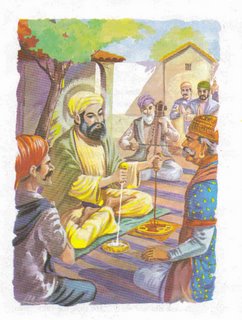
From Lalo’s bread flowed milk and from Malik Bhago’s cake there poured a stream of blood.
Malik Bhago looked horrified. “Why is there blood coming form my make and milked from Lalo’s coarse bread?” He asked.
“Lalo’s bread was earned by honest hard work. But your cake and the riches you have collected have all been gained by robbing and cheating the poor.” Guru Nanak Dev Ji replied.
Malik Bhago admitted that (Guru) Nanak had spoken justly. He felt ashamed of his evil deeds. Thus, Nanak changed yet another man from his sinful ways to a life devoted to helping the poor and needy.
There is Only one God
While (Guru) Nanak was traveling over the countryside, he often saw people praying before stone images of gods and goddesses. They put the idols to bed at night, woke them in the morning, dressed them in silks, and gave them food to eat. They firmly believed that these idols hand the power of granting them all their wishes and of making them rich and happy. “if we serve them in
 this way, our gods will be pleased with us,” the people said, “and they will surely reward us.”
this way, our gods will be pleased with us,” the people said, “and they will surely reward us.”(Guru) Nanak tired to show them that their ways of worshipping God were wrong. He question themed, “you say you are good Hindus. Yet all you do is go to the temple once a day and burn incense before stone image. The rest of the day you lie, and cheat and steal. Why should God be pleased with you?”
The people thought for a moment about what Nanak had said, and then replied, “you are right. But our fathers, and their fathers before them, taught us that this is the right way of showing our love for God. Everyone else considers us to be good Hindus, because respect our gods and honor them by taking out in procession on festivals and arranging feasts for them.”
“You are like children, not sure what is right or what is wrong,” (Guru) Nanak told them. “you should asked the advice and guidance of a teach, a guru. He will help you whenever you are in doubt. All men have goodness in them; but as the sunflower only opens to rays of the sun, so men need a Guru to open up the goodness that is in their hearts and show them the way to God.”

“You know that there is only one God.” (Guru) Nanak replied. “he made everything—he made you and me and everyone else. He made the flowers the birds and the trees. You should pray to God often, wherever you are, and repeat His name. but prayer alone is not enough. You should cleanse your mind of all unkind thoughts. Help people in distress, work hard and given some of your earnings to the poor.”
Thus, wherever Guru Nanak Dev Ji went, he converted large number of people by his teachings. These people become his disciplines and called themselves Sikhs, to the day the followers of (Guru) Nanak are known ask Sikhs.
Sajjan the Robber
There lived a famous robber called Sajjan. He was as cunning of a man as he was cruel. He built a temple full of gods and goddesses for the Hindus and the mosque for the Muslims. “this will lure both Hindus and Muslims to my house,” he said to himself, “and, at night, when they are asleep I shall steal all of their money and jewels and kill them.”
One day (Guru) Nanak was passing nearby and decided to spend the night at Sajjan’s house. Sajjan welcomed him warmly and spread out a great feast of tasty dishes before him. but all the time he was thinking, “this man, Nanak looks very happy and content. He must be very rich. Tonight I will rob him of all his money and then murder him. No one will anything about.”
At sunset Sajjan began to urge (Guru) Nanak to go to bed early. “it is getting late you look tired,” he said in a voice full of concern for his guest.
(Guru) Nanak answered that he always sang a hymn before retiring for the night. Sajjan was getting impatient but he agreed to sit down for a few minutes and listen to (Guru) Nanak. Guru Nanak Dev Ji sang a song he had composed himself:
Herons and birds of prey are found in holy places
Yet they eat living things;
They are beautiful
Yet their hearts are evil.
Sajjan realized that what (Guru) Nanak said about herons and hawks applied to him too.
“What Nanak says it quite true,” he admitted to himself. “I might appear kind and friendly, but I am like these birds Nanak speaks of. Although I do not eat people I do almost the same thing, for I kill them.” He fell down at Nanak’s feet and asked his forgiveness.
(Guru) Nanak said, “Sajjan, only God can forgive you. And God only forgives those who admit their sins openly and repair the wrongs they have done. Tell me how many people have you robbed and killed?”
Sajjan looked very ashamed. “I have murdered and robbed many hundreds of men, women and children. how would I possibly obtain God’s forgiveness for all my evil deeds?”
“Give away all you have gained in this way to the poor.” Guru Nanak Dev Ji said.
Sajjan did as (Guru) Nanak had asked and became his follower. The first Sikh temple in India was built by Sajjan the robber, in gratitude to (Guru) Nanak who had changed his way of life.
God is Everywhere
(Guru) Nanak’s last journey was towards the west. He wanted to go and see the places which Muslims considered holy. So he joined a band of pilgrims on their way to Mecca.
One day, during the journey, he fell asleep in the mosque. Suddenly he was shaken awake. Standing above him, glaring down at him furiously, was a Mullah, the Muslim priest of the mosque.
“What do you think you are doing?” the Mullah demanded angrily. “have you no respect for religion? Why are you sleeping with your feet towards Mecca which is the house of God?”
(Guru) Nanak replied gently, “If I have made a mistake, please correct me. Turn my feet to where there is no God.”
The Mullah was taken aback. “You know that you should always face Mecca,” he said. “even our dead are buried with their faces towards Mecca.”
Guru Nanak Dev Ji replied, “But God is everywhere. Your own holy book the Koran says ‘whichever way you turn, there is the face of Allah.’
On hearing such wisdom the Mullah fell down at Nanak’s feet in admiration and asked Nanak to forgive him.
After this, (Guru) Nanak went to Mecca and from there Medina and westwards to Baghdad. Everywhere he met people who believed firmly that they were very religions and devoted to God.
“It is obvious that we love God,” they told (Guru) Nanak whenever he questioned them. “we observe our yearly fast, we go on pilgrimages and we pray five times a day.”
“Yes, you do all these things,” (Guru) Nanak gently scolded them, “but you forget to be honest, kind and generous. Giving one rupee to a poor, hungry child is more important to God than 100 prayers. Being truthful is of greater value than a thousand fasts. Kindness and consideration please God more than any number of pilgrimages.”
In this way (Guru) Nanak won the hearts of many Muslims.
God Made all Men Equal
(Guru) Nanak returned to the Punjab after many months. He wished to end his days in the country-side he knew and loved best. So he settled down with his family at a small town named Kartarpur.
One question kept troubling him, “are not all men equal? When then is the Brahmin regarded as holier than the Sweeper? Surely this division of man from man is inhuman?” (Guru) Nanak often said.
So he decided to true and change the system which by building walls better men cause such bitterness.
“I will make sure that that any men or women who come to me, be they rich or poor, or high case or low, shall eat together. They shall take it in turn to cook and wash dishes. For why should only the Brahmin be considered clean enough to cook?” Nanak said. “And moreover all shall recite prayers. Then we shall have no priests who can look down other men.”
Large numbers of people began to gather to see (Guru) Nanak and hear him speak of god. (Guru) Nanak told them how they should live. He asked them to wake up three hours before sunrise, bathe in the stream and then go to the temple to recite morning prayers and sing hymns. Thereafter they were to be free to earn their livings. In the evening after having done a full day’s work, be it farming, shop-keeping or weaving, the people were asked to gather to pray and sing hymns. After this they all dined together in the temple. Before going to bed to sleep, everyone was expected to say another short prayer.
This become the life of work and prayer of (Guru) Nanak’s followers all over the country.
Guru Nanak Dev Ji chooses a Successor
As (Guru) Nanak grew older, he began to look around for someone who could carry on the worked he had started. He did not think either of his two sons fit for the job. His elder son, Sri Chand, had become a hermit. He lived alone in the forest, praying and fasting. “how can a man guide people if he cuts himself away and goes and prays alone in the forest,” (Guru) Nanak always said. Nanak’s younger son, Lakshmi Das, was the exact opposite. He was only interested in making money. So who could Nanak choose as his successor?
Among his followers, (Guru) Nanak was very impressed by a man named Lehna, who had repeatedly proved his great devotion to God. (Guru) Nanak changed Lehna’s name to Angad which means ‘of my own body’ and told him to spread his message and set an example for all.
The years went swiftly by and (Guru) Nanak was now approaching 70. with old age he became frail, but his interest in the world around did not wane. The woodlands in the flower, the mustard in bloom and the calling of the Papeeha as the monsoon broke, still sent him into poetic rapture.
 Nor did his love for the people lessen with the years. He was never too tired to listen to their problems and was always ready to offer words of comfort and advice. The circle of peole who respect him and followed his guidance increased daily…..
Nor did his love for the people lessen with the years. He was never too tired to listen to their problems and was always ready to offer words of comfort and advice. The circle of peole who respect him and followed his guidance increased daily…..
There is Never Enough of Goodness
People often ask, “What did Guru Nanak Dev Ji do which was so unusual?” he himself admitted that he was not a special messenger of God and could perform no miracles except reciting the name of God. He was just a teacher like so many others. And India is full of teachers and holy men.
(Guru) Nanak answers this when he tells of an incident at Multan, during his travels. A local priest came up to him and presented him with a cup of milk, filled to brim saying, “This city is already full of holy men. We have no room for, nor need of anyone else.”
(Guru) Nanak plucked a petal of jasmine flower and put it in the cup, where it floated on the milk and scented it.
“There is always room for holiness and goodness,” Guru Nanak Dev Ji answers. “Just as one jasmine petal can perfume a whole bowlful of milk so can one man re-fill the world with the fragrance of faith in God and in good deeds!”
Nanak Naam Milay Taa Jevaa
Dhan Dhan Sri Guru Nanak Dev Ji
Dhan Dhan Guru De Sikh
Dhan Dhan Guru De Sangat
Dhan Dhan Sri Guru Nanak Dev Ji
Dhan Dhan Sri Guru Granth Sahib Ji
Nanak Naam Milay Taa Jevaa

